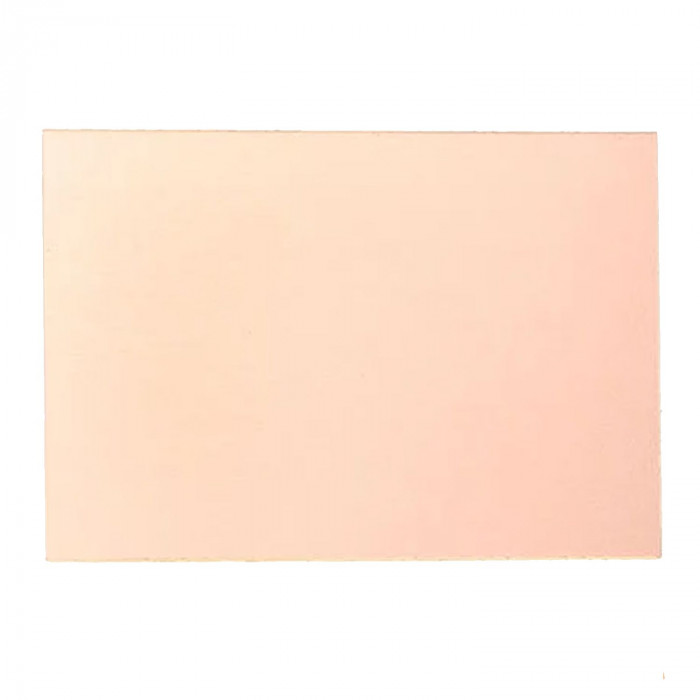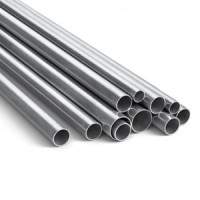Foil fiberglass bilateral 100x150 mm is a layered material made on the basis of fiberglass and epoxy binder. Features of the FR-4 production technology provide PP with high thermal and chemical resistance, increased requirements for dielectric constant, warpage and hygroscopicity.
Fiberglass FR-4 is the base material for the production of double-sided and multilayer printed circuit boards, as well as for the production of single-sided printed circuit boards with increased requirements for physical and mechanical properties.
Type of reinforcing filler Layered
Warranty period 12 months
Hygroscopic No
Thermal conductivity coefficient 3 W/(m*K)
Maximum operating temperature 85 degrees.
Matrix material Polymer
The minimum working temperature is -60 degrees.
Young's modulus 330 GPa
Density 18 g/cm3
Porosity 5%
Hardness 150 HV
Composite material type
Material toxicity No
Impact strength 35 kJ/m2
User specifications
Dielectric constant at a frequency of 1 MHz, not more than 5.5
Surface electrical resistance, not less than 5x10*9 Ohm
Glass transition temperature 135-155 °C
Foiled fiberglass is a composite material based on pressed plastic, consisting of fiberglass treated with a binder (thermosetting or epoxy), and facing from copper electrolytic foil on one or both sides.
Application and storage conditions
The main application of foil fiberglass is the manufacture of conventional and multilayer printed circuit boards in the radio engineering, instrument-making and electronic industries. The material, having excellent mechanical and electrical insulating properties, easily tolerates mechanical processing - cutting, drilling and stamping.
Basic requirements for storage conditions:
- closed dry rooms with humidity up to 75%;
- racks for horizontal storage, located from the floor surface by more than 50 mm;
- the content of impurities in the air of solvent and acid vapors is excluded;
- temperature in the warehouse from -10°С to +35°С.
Material properties
Foil fiberglass is characterized by the following properties:
- fire resistance;
- resistance to temperature fluctuations;
- elasticity;
- wear resistance;
- minimal effort during processing;
- reduced specific gravity;
- does not harm the environment;
- does not accumulate static electricity;
- resistance to moisture;
- operational durability;
- optimal cost in comparison with other materials.
Common brands
In the post-Soviet space, the following brands are most popular:
- SF - foil fiberglass, manufactured in accordance with GOST 10316-78, differs in the operating temperature of most of its modifications from -60 to +85 ° C (some types can operate up to + 100 ° C), the use of a thermosetting binder for impregnating fiberglass and the thickness of the facing foils 18 and 50 microns;
- STF - a heat-resistant material manufactured in accordance with GOST 26246.5-89 and characterized by a working temperature from -60 to +105 ° C, the use of an epoxy binder and a foil thickness of 18, 25, 35, 50 and 70 microns.
Foiled fiberglass FR-4 is generally recognized in the world production of circuit boards. In its manufacture, the vacuum pressing method, an epoxy binder when impregnating fiberglass and an insulating foil with a thickness of 18-105 mm are used. Operating temperature range from -60 to +155°C
Properties of fiberglass
There are several grades of material that differ slightly from each other in some parameters, but they are united by common characteristics:
Good thermal conductivity.
Increased moisture resistance.
High strength.
Light weight products.
Resistant to external influences and temperature extremes.
Biological stability and non-toxicity.
Fire resistant.
High electrical insulating properties.
Long service life.
Products and variants
One of the most common material options in the industry is a sheet of various sizes.
Sheet products (technical specifications GOST 12652-74) is a layered structural or electrical plastic, which is based on fiberglass impregnated with an epoxy solution. They are characterized by high mechanical strength.
Depending on the purpose and properties, fiberglass is produced in the following grades:
STEF brand glass fiber GOST 12652-74 STEF brand fiberglass is designed to operate outdoors under conditions of normal relative humidity (relative humidity 45–75% at 15–35 °C) at a voltage of over 1000 V and a current frequency of 50 Hz, as well as for operation in air in conditions of high ambient humidity (relative humidity (93±2)% at a temperature of (40±2) °С) at voltage up to 1000 V and current frequency 50 Hz. Possesses high mechanical strength at moderate temperaturesperatures. Symbol interpretation: ST - fiberglass EF - epoxy-phenol-formaldehyde or epoxy binder Thickness range: 1.5-50 mm Thickness range: 0.5-100 mm Long-term permissible operating temperature: from -65°С to +155°С Guaranteed shelf life - 18 months from the date of manufacture It is allowed to use fiberglass at relative air humidity (93 ± 2)%, temperature (40 ± 2) ° C and voltage of 1000 V.
Glass fiber STEF-1 brand GOST 12652-74 STEF-1 glass fiber is the same as STEF, but with a more uniform fine internal and surface structure (higher quality fiberglass in production) Thickness range: 0.5-100 mm Long-term permissible operating temperature: from -65°C to +155°C It is allowed to use fiberglass at relative air humidity (93±2)%, temperature (40±2)°C and voltage of 1000 V. Guaranteed shelf life - 18 months from the date of manufacture
Glass fiber STEF-U
TU 1689 I79.0066.002T Glass fiber STEF-U (unified) is designed to operate outdoors under conditions of normal relative humidity (relative humidity 45 - 75% at a temperature of 15 - 35 ° C) at a voltage of over 1000 V and a current frequency of 50 Hz, as well as for operation in air in conditions of high ambient humidity (relative humidity (93 ± 2)% at a temperature of (40 ± 2) ° C) at a voltage of up to 1000 V and a current frequency of 50 Hz. It has good stability of electrical properties at high humidity, high mechanical strength at moderate temperature. Fiberglass is resistant to the action of a mixture of freon R-134a with oil XC 22. Symbol interpretation: ST - fiberglass EF - epoxy-phenol-formaldehyde or epoxy binder U - unified Thickness range: 0.35-50 mm Long-term permissible operating temperature: from -65 ° C up to +155°С Guaranteed shelf life — 18 months from the date of manufacture
Fiberglass STED brand (today the material is not produced!!!) GOST 12652-74 The same as STEF, but with higher mechanical and dielectric characteristics and for operation in transformer oil. Thickness range: 0.5-50 mm Long-term permissible operating temperature: from -65°C to +130°C Guaranteed shelf life - 18 months from the date of manufacture.
STEB grade glass fiber GOST 12652-74 STEB grade fiberglass is the same as STEF, but with reduced flammability. (bromine added) Thickness range: 1.5-50 mm Long-term permissible operating temperature: from -65°С to +140°С Guaranteed shelf life - 18 months from the date of manufacture.
ST-ETF grade glass fiber GOST 12652-74 ST-ETF grade fiberglass is a material with increased heat resistance. Thickness range: 0.35-50 mm Long-term permissible operating temperature: from -65°C to +180°C Guaranteed shelf life - 18 months from the date of manufacture.
Semiconductive glass fiber STEF-P TU 16-503.168-78 STEF-P glass fiber is used for sealing stator windings of hydrogenerators. Long-term permissible operating temperature: from -65°С to +155°С. Thickness range: 0.2-5 mm. Guaranteed shelf life - 18 months from the date of manufacture.
Semiconductive glass fiber STEF-PV TU 16-503.168-78 STEF-PV glass fiber is used for sealing windings in stator grooves of high-voltage electrical machines. Long-term permissible operating temperature: from -65°С to +155°С. Thickness range: 0.4-1 mm. Guaranteed shelf life - 21 months from the date of manufacture. Explanation of the symbol: ST - fiberglass EF - epoxy-phenol-formaldehyde enamel P - semi-conductive B - wavy
Fiberglass grade KAST-V
GOST 10292-74 It is used for lining vibrofurnaces, for electrode plates of electrodialysis apparatuses, in machines for the production of chemical fibers, for the manufacture of parts for radio engineering and electrical purposes. KAST-V is a high-strength, non-toxic, flame-retardant sheet material. It works for a long time at temperatures up to 250 ° C, for a short time - up to 750 ° C. KAST-VS is a non-toxic, slow-burning, self-extinguishing sheet material. It is recommended for use in products requiring increased mechanical strength and reduced flammability. Fiberglass KAST-V is supplied in sheets with a thickness of 0.5 to 90 mm, up to 1000x2450 mm in size. either (1430*930mm)
Fiberglass grade VFT-S
GOST 10292-74
It is made on the basis of structural fiberglass and a modified thermosetting binder. The material is difficult to combust, non-toxic. Products made of fiberglass VFT-S are moisture resistant, durable, can work for a long time at temperatures up to 350 ° C, for a short time - up to 1000'C. Fiberglass VFT-S is supplied in sheets 0.8-35 mm thick, 1000x2450 mm in size.
You can buy Foil fiberglass bilateral 100x150 mm from us at the best price in Ukraine. A wide range of products allows us to quickly and efficiently fulfill any order, helping to complete any construction work on time.
No questions about this product, be the first and ask your question.





